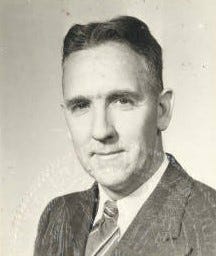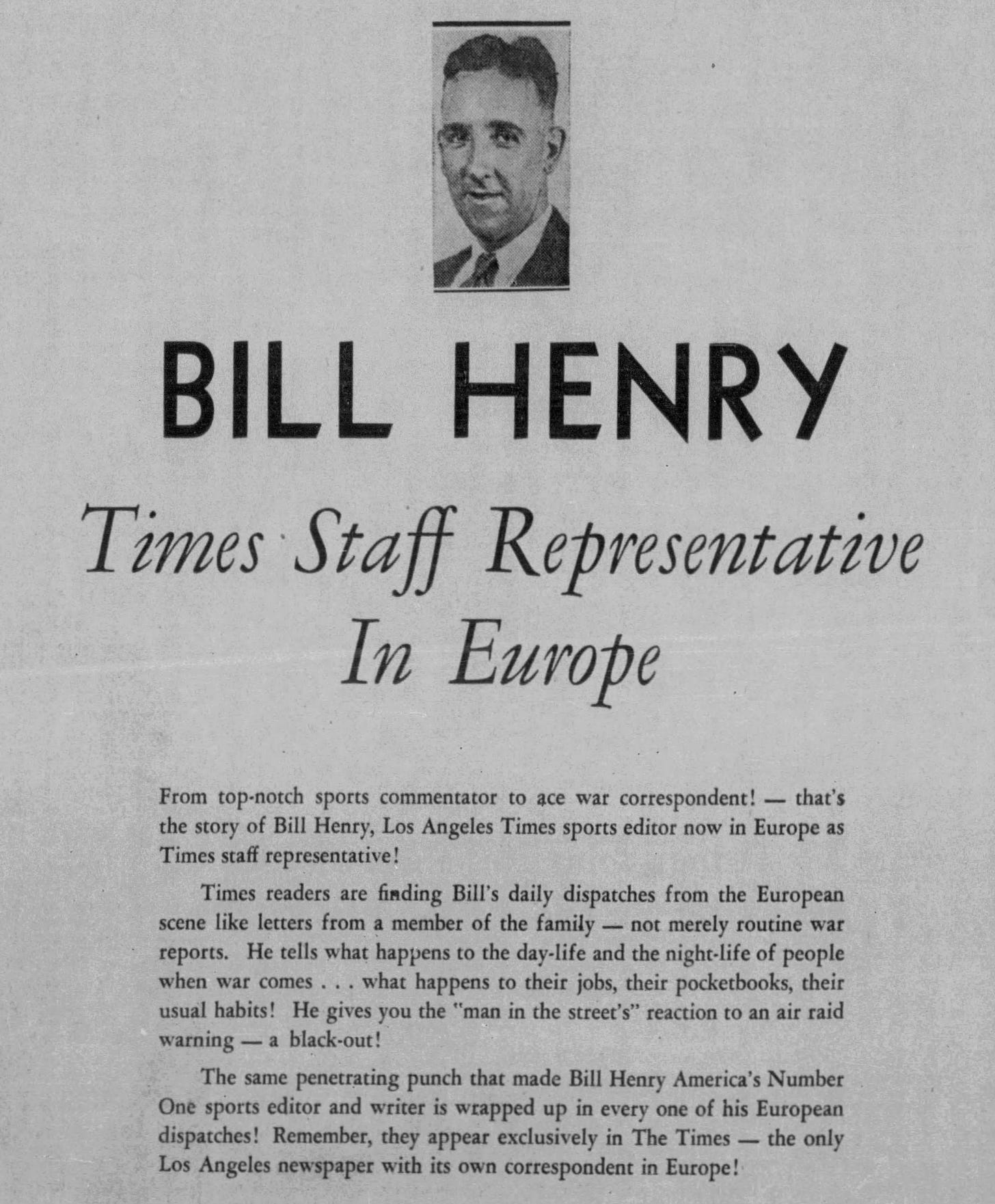Bill Henry's battlefield promotion to war correspondent
LONDON, Sept. 1 — Tonight, with war seemingly certain to come with the dawn, the world’s greatest city is shrouded in inky blackness of her own making.
There are shadowy figures of boyish reservists swinging along the streets, prepared to swap afternoon clothes for uniforms. And under eerie blue lights are faces grim but unafraid.
Pink-cheeked girls stride bravely to air-raid headquarters, wearing blue chauffeurs’ uniforms and prepared to do their bit.
England, young and old, is ready to face what dawn may bring.
That was the lead of Bill Henry’s page-one story in the Sept. 2, 1939 Los Angeles Times, written hours after Germany’s invasion of Poland. While Britain would wait until Sept. 3 to declare war, the wheels of what would became the greatest catastrophe the world has ever seen were well in motion as he typed away in London.
Henry had arrived in Europe a couple of weeks earlier on a mission that could not have been more at odds with what he was now covering.
Seven years earlier, he had served as technical director for the Los Angeles Olympics while taking on additional duties as the public address announcer for events held at the Coliseum. He became sports editor of the Times the following year and in that capacity covered the 1936 Berlin Games.
In August 1939, he traveled to Finland for a trip that combined both of his roles with previous Olympics, doing a bit of consulting with the organizers of the 1940 Helsinki Games at the behest of the International Olympic Committee while also reporting on their progress one year out from the opening ceremony.
Though it was clear at that point that the global geopolitical situation was highly unstable, it was impossible for anyone to predict the scope of what was to come. Still, the headlines out of Europe were ominous.
On Aug. 26, Henry received a telegram in Helsinki from Times managing editor L.D. Hotchkiss. It read: “IF WAR COMES WOULD LIKE YOU STAY AWHILE REPLY IMMEDIATELY”.
William Mellors Henry was born in San Francisco on Aug. 21, 1890, the son of a traveling Baptist evangelist. His father’s occupation led to Henry becoming something of a citizen of the world early in life.
He would end up attending two different schools in England and one in Switzerland before the family settled in Los Angeles in time for him to graduate from high school there in 1909. He earned a degree from Occidental College but not before taking a year to study in Australia at the University of Sydney, where he developed an affinity for rugby.
As the story goes, he pitched a series of articles on the sport to the Times upon his return in 1912 and ended up joining the newspaper’s staff part-time as an assistant to sports editor Harry Carr.
Though he would leave for a while on several occasions to pursue one passion or another, such as his Olympics work, Henry kept coming back. His last piece for the Times would run just over a week before his death.
While sports was Henry’s primary focus as he learned the trade, he also wrote about aviation, automobiles, music, theater and the movies over the years.
His childhood and involvement with the Olympics made him comfortable working with people across a wide swath of cultures, so it was hardly an outrageous idea to have him stick around London once war did indeed come to Europe.
On the day he received that telegram in Finland, though, he and everyone else hoped it wouldn’t come to that. In a special CBS broadcast from Helsinki on Aug. 27, Henry assured listeners that the city intended to welcome the athletes of the world the following summer.
“Finland is firmly resolved that no matter what will happen elsewhere, the 1940 Olympic Games will go on,” he said.
Back in London three days later, Henry’s initial front-page dispatch read as if it had been written by a seasoned foreign correspondent who had been in the city for months if not years.
“Official sources maintained silence regarding the contents of the diplomatic notes,” he wrote of the last-ditch diplomacy ongoing between Britain and Germany, “but informed quarters declared that neither the British Government nor Hitler is weakening in the diplomatic jockeying.
“Consequently it is believed that the danger of war is not lessening, with an increasing fear that trouble may start at the point where Poland has countered the German militarization of Slovakia with increased mobilization.”
Dispatches like that undoubtedly reassured the powers that be back in Los Angeles that they had made the right move, and Henry would indeed prove a valuable asset as the war — such as it was outside of Poland in those early days — began in earnest.
In anticipation of the hostilities, other U.S. correspondents already in London had put in requests to local authorities to accompany the British Expeditionary Force to France, and Henry wrote to Hotchkiss on Sept. 18 that he had petitioned to join that group.
His affiliation with CBS ended up getting him over the top, as Edward R. Murrow pushed to have him included in the group along with the likes of the Associated Press, United Press, the New York Times, the Chicago Tribune and other outlets with far more robust foreign services than the Los Angeles Times.
On Oct. 10, Henry and eight other U.S. correspondents flew to France. His first dateline from the continent read WITH THE ROYAL AIR FORCE IN FRANCE, and the RAF would be the focus of much of his reporting during his time there.
This was early in what would come to be known as the “Phoney War,” when nothing much was happening on the western front from the fall of 1939 into the spring of 1940, so Henry’s dispatches tended to play up relatively minor action. The veteran correspondent was a sufficiently gifted writer and storyteller that had made it work.
One such piece was filed Nov. 1 and appeared in the following day’s Times. In it, Henry told the tale of “a tall quiet lad from Leicestershire” who had scrambled his fighter plane to intercept a German reconnaissance plane over France:
Playing hide-and-seek among vagrant clouds and keeping behind and under the swift-moving invader, the youthful pilot stalked his foe with the cool carefulness of a veteran huntsman, for one false move might bring him under the fire of machine guns sprouting in every direction from the German plane.
So skillfully did he play his game that not until he had swung up within 300 yards did he feel that further hiding was impossible. He sprang to the attack.
Pointing his plane dead on the center of the enemy’s fuselage he loosed a sputtering, scorching hail of bullets so well aimed that with one searing blast it was all over. The giant invader started a mad, screeching spin which ended far below in a flaming crash on a French hillside.
On Nov. 26, the Times announced in a story that ran down the left rail of its front page that Henry had been recalled from Europe to write a column “which the Times believes will be the most interesting ever published by this newspaper.”
“Activity on the western front apparently has developed into a stalemate until spring, at least, and it was felt that Mr. Henry’s facile pen would be of much more value to Times readers in the home sector,” the editors wrote.
Before heading for home, Henry would file one last story from Paris on Nov. 30. It concluded this way:
“No person can witness, as I have in three months, the complete diversion of a continent’s useful energy from the worthwhile productivity of peace to the destructive ways of war without hoping that this sort of thing shall never happen again, and certainly not to us.”
Henry flew back to New York via Lisbon on the Pan Am Clipper, sharing a conversation with U.S. Ambassador to the United Kingdom Joseph P. Kennedy on the flight. That became a front-page story in its own right, getting Henry off to a premature start on decades spent writing about politicians and other public figures.
He arrived in Los Angeles on Dec. 9 and the first installment of his column, titled “By the Way with Bill Henry,” appeared in the following day’s editions.
Elsewhere in the paper that day: the latest accounts of Russia’s invasion of Finland. Those Helsinki Olympics that Henry had so desperately wanted to go off as scheduled would have to wait until 1952.
Henry would miss out on attending those Games as his columnist duties required him to be in Chicago to cover the Democratic National Convention. But he did cover the 1948 London Games and 1956 Melbourne Olympics as a broadcaster, and he served on the organizing committee for the 1960 Winter Olympics in Squaw Valley, California. In 1948, he published the book An Approved History of the Olympic Games.
While Henry occasionally wrote about the Olympics and other sports topics for the Times, he spent the next few decades as an influential general columnist and radio commentator. He lived mostly in Washington, D.C. during that period and ended up accompanying officials from multiple administrations on foreign trips.
When Vice President Richard Nixon visited Africa in 1957, Henry was there. Same with President Dwight D. Eisenhower’s jaunts to Spain in 1959 and the Philippines in 1960, and President John F. Kennedy’s trip to Paris, Vienna and London in 1961.
Henry hosted a radio program called “5 Minutes of News” for CBS from 1943-48 and moved the show to Mutual Broadcasting from 1948-54. He also continued to cover political conventions in presidential election years through 1968.
In early April 1970, President Nixon announced Henry would be among the next round of recipients of the Presidential Medal of Freedom, with the ceremony set for April 22 at the White House.
But Henry didn’t make it. He died April 13 at age 79.
Nixon wrote a note that day to Corinne, Henry’s wife since 1914. It read in part:
“Bill was a man deeply dedicated to his profession and he set high goals for himself. His intense loyalty to our nation, his passion for freedom and justice were the only challenges he needed in life. Bill loved people. He believed in them and he worked for them.”





